Module 9 Great inventions Unit 2 Will books be replaced by the Internet?课件31张PPT
文档属性
| 名称 | Module 9 Great inventions Unit 2 Will books be replaced by the Internet?课件31张PPT |
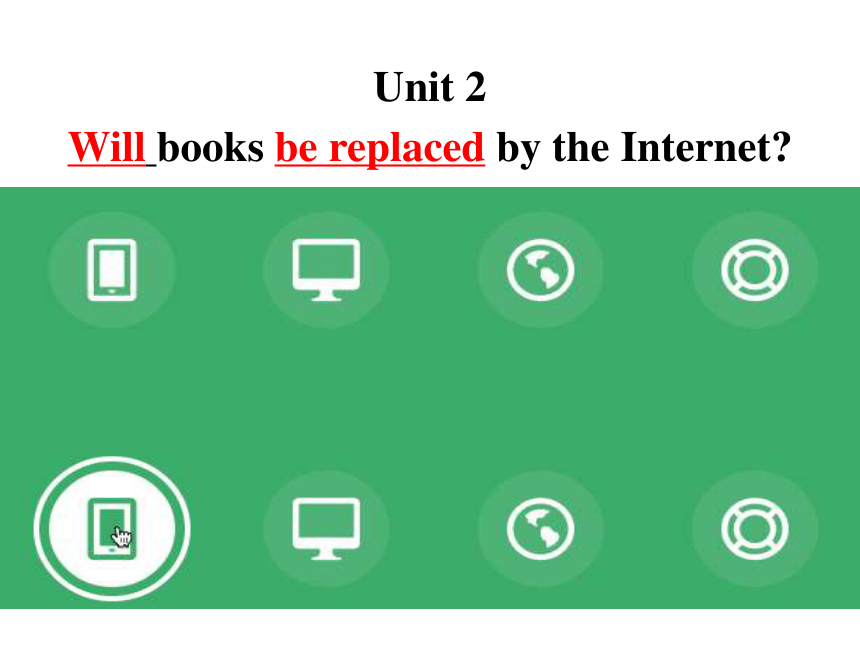
|
|
| 格式 | zip | ||
| 文件大小 | 4.7MB | ||
| 资源类型 | 教案 | ||
| 版本资源 | 外研版 | ||
| 科目 | 英语 | ||
| 更新时间 | 2020-07-31 20:40:17 | ||
图片预览

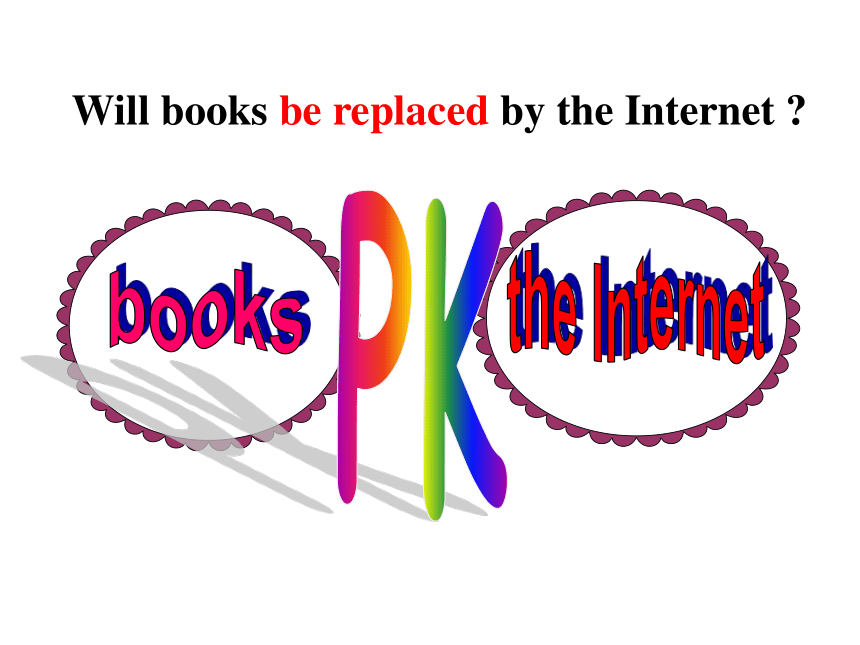
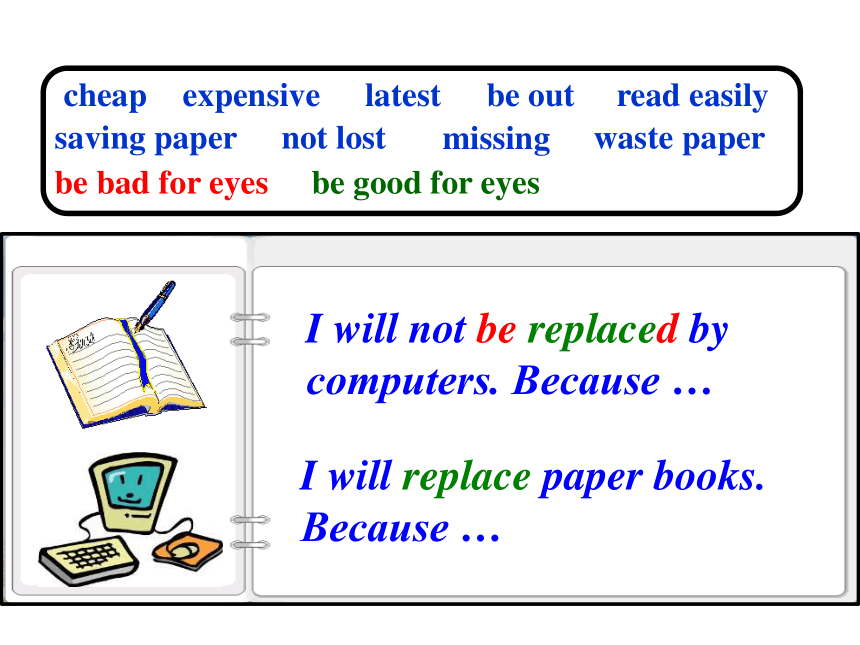
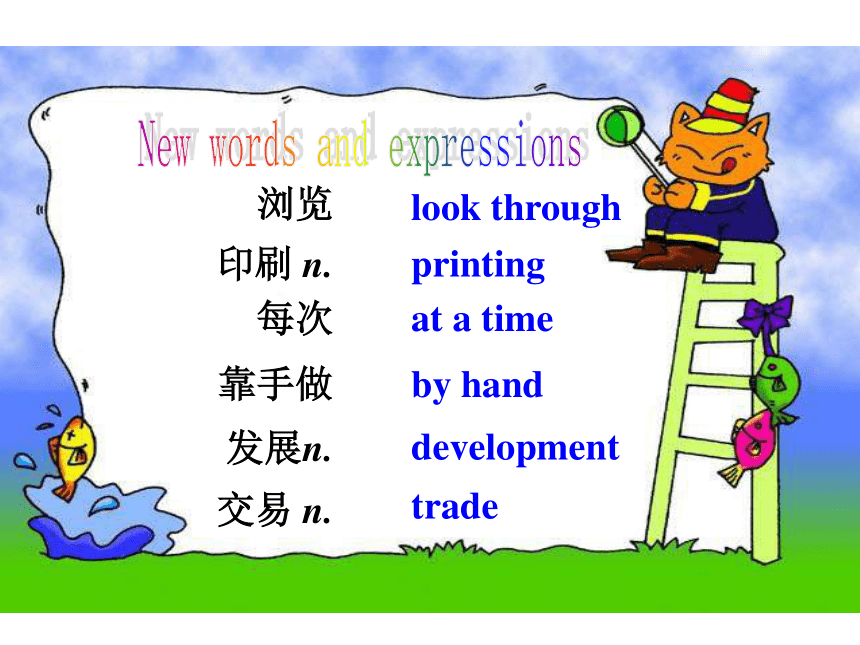
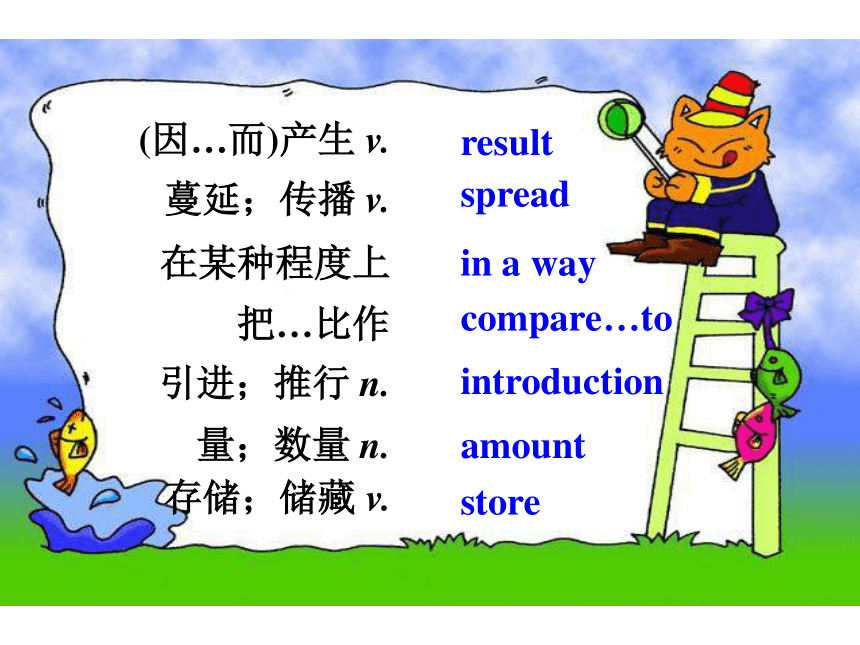
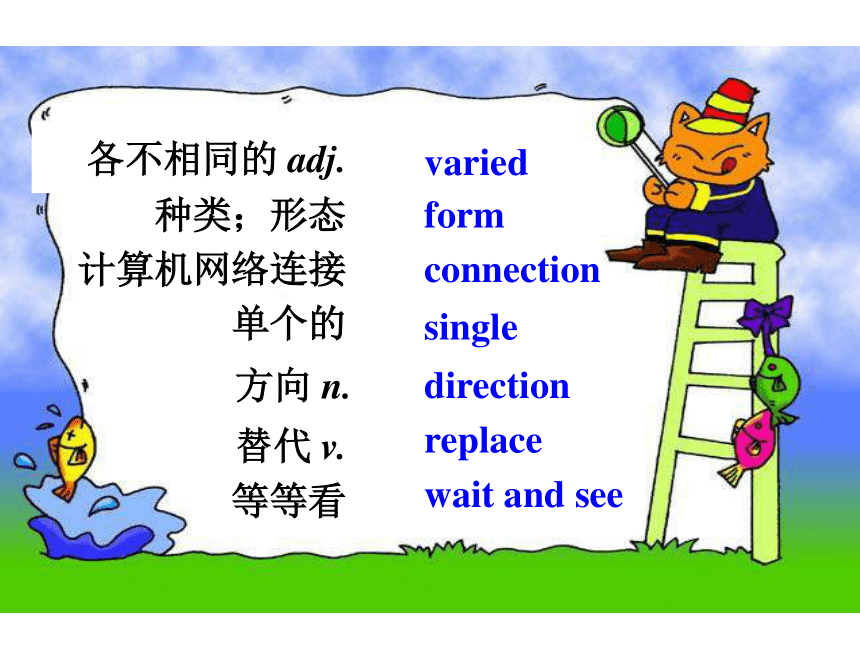

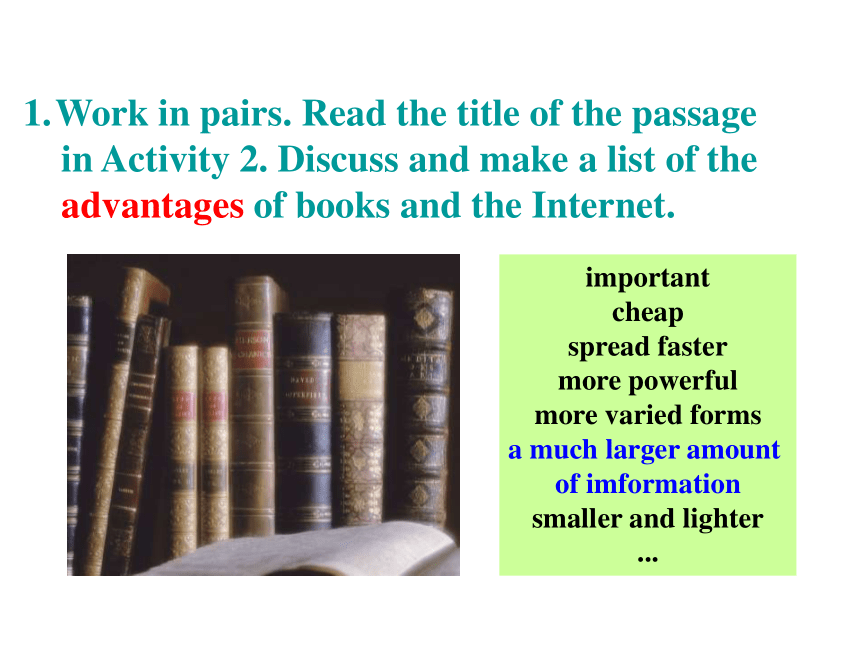
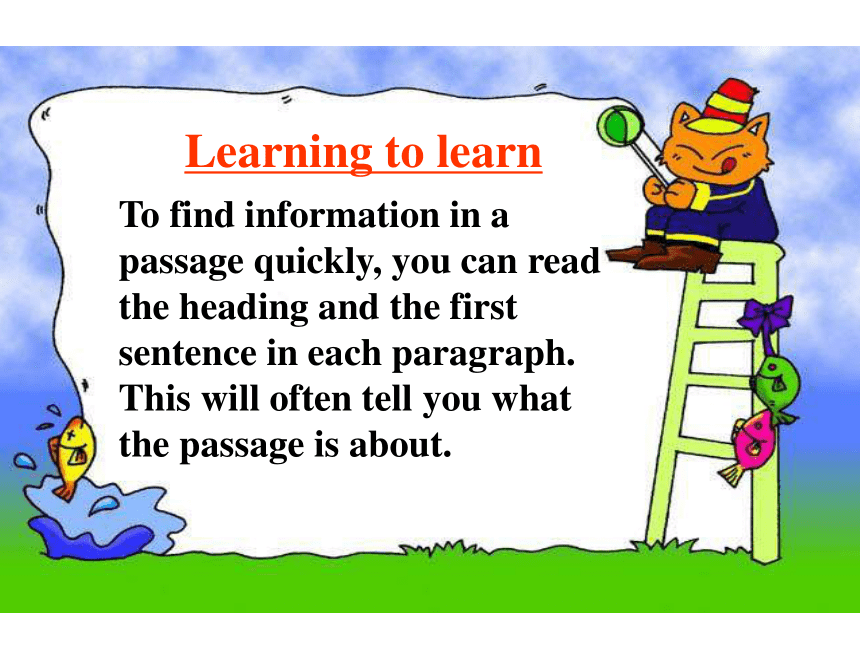

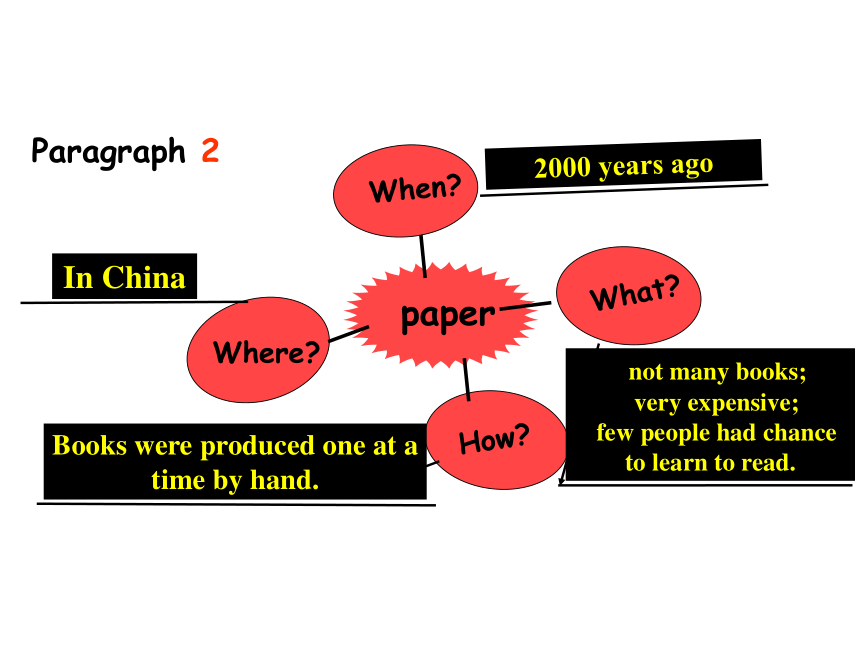
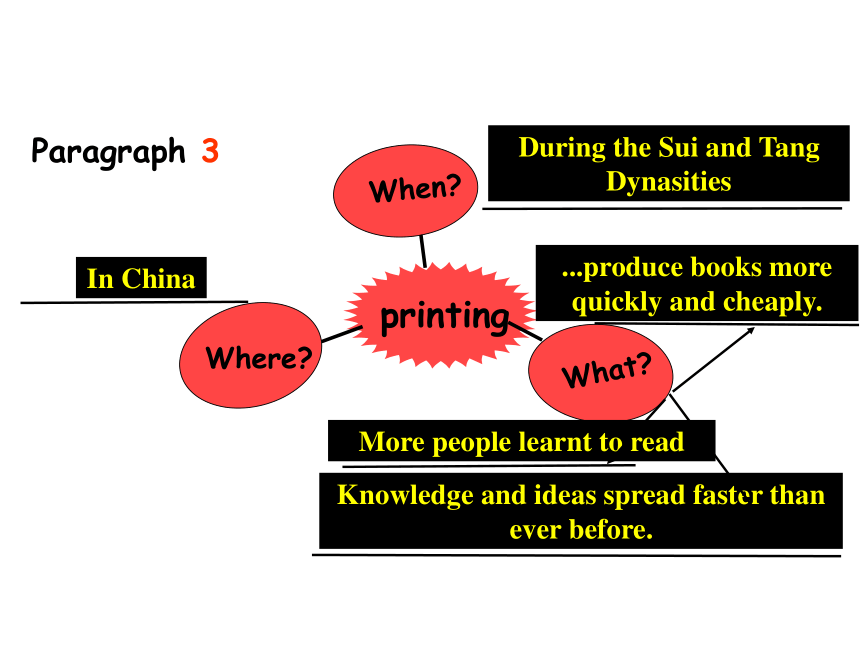
文档简介
(共31张PPT)
Unit
2
Will
books
be
replaced
by
the
Internet?
Will
books
be
replaced
by
the
Internet
?
I
will
not
be
replaced
by
computers.
Because
…
I
will
replace
paper
books.
Because
…
cheap
latest
saving
paper
not
lost
read
easily
be
bad
for
eyes
expensive
be
out
missing
waste
paper
be
good
for
eyes
浏览
look
through
交易
n.
trade
by
hand
靠手做
development
发展n.
at
a
time
每次
printing
印刷
n.
result
(因…而)产生
v.
蔓延;传播
v.
spread
compare…to
把…比作
introduction
引进;推行
n.
in
a
way
在某种程度上
量;数量
n.
amount
store
存储;储藏
v.
各不相同的
adj.
varied
替代
v.
replace
connection
计算机网络连接
single
单个的
form
种类;形态
direction
wait
and
see
方向
n.
等等看
Work
in
pairs.
Read
the
title
of
the
passage
in
Activity
2.
Discuss
and
make
a
list
of
the
advantages
of
books
and
the
Internet.
important
cheap
spread
faster
more
powerful
more
varied
forms
a
much
larger
amount
of
imformation
smaller
and
lighter
...
Learning
to
learn
To
find
information
in
a
passage
quickly,
you
can
read
the
heading
and
the
first
sentence
in
each
paragraph.
This
will
often
tell
you
what
the
passage
is
about.
Paragraph
1
2000
years
ago
In
China
Books
were
produced
one
at
a
time
by
hand.
not
many
books;
very
expensive;
few
people
had
chance
to
learn
to
read.
Paragraph
2
During
the
Sui
and
Tang
Dynasities
In
China
...produce
books
more
quickly
and
cheaply.
More
people
learnt
to
read
Knowledge
and
ideas
spread
faster
than
ever
before.
Paragraph
3
larger
more
varied
more
easily
are
used
Paragraphs
4-5
3.
Complete
the
table.
paper
created
printing
invented
A
much
larger
and
more
varied
amount
of
information
can
be
stored
on
the
Internet
than
in
books.
Someone
with
an
Internet
connection
can
find
information
much
more
easily
than
they
can
find
it
in
printed
forms
When
What
About
2,000
years
ago
During
the
Sui
and
Tang
Dynasties
Today
Will
books
be
replaced
by
the
Internet?
Every
morning,
my
father
buys
a
newspaper
on
his
way
to
work.
Every
day,
I
open
my
books
in
class
and
start
my
lessons.
Every
evening,
my
mother
looks
through
magazines
at
home.
And
every
night,
I
look
at
the
photos
of
David
Beckham
and
Yao
Ming
on
my
bedroom
wall
before
I
go
to
sleep.
Can
we
imagine
life
without
paper
or
printing?
Paper
was
first
created
about
2,000
years
ago
in
China
.After
its
invention,
people
started
to
write
on
paper
to
make
books.
In
those
days,
books
were
only
produced
one
at
a
time
by
hand.
As
a
result,
there
were
not
many
books,
and
they
were
expensive.
So,
few
people
had
the
chance
to
learn
to
read.
Printing
was
invented
in
China
during
the
Sui
and
Tang
Dynasties.
Later,
developments
in
printing
made
it
possible
to
produce
books
more
quickly
and
cheaply.
A
trade
in
books
resulted,
and
more
people
learnt
to
read.
Knowledge
and
ideas
spread
faster
than
ever
before.
In
a
way,
We
can
compare
the
invention
of
paper
and
printing
to
the
introduction
of
the
Internet
in
the
twentieth
century.
Although
the
Internet
is
still
young,
it
is
growing
very
fast,
and
may
become
more
powerful
than
printing.
A
much
larger
amount
of
information
can
be
stored
in
more
varied
forms
on
the
Internet
than
in
books.
Someone
with
an
Internet
connection
can
find
information
much
more
easily
than
they
can
find
it
in
printed
forms.
And
the
machines
we
use
to
read
it
are
now
small
and
light,
often
smaller
and
lighter
than
a
single
book.
Computers
and
the
Internet
are
used
in
classrooms
now,
and
newspapers
and
magazines
are
already
read
online.
So
what
direction
will
traditional
printing
take
in
the
future?
Will
books
be
replaced
by
the
Internet?
Let’s
wait
and
see.
4.
Complete
the
passage
with
the
words
in
the
box.
developments,
direction,
introduction,
powerful,
replace,
spread,
trade
Books
were
expensive
after
paper
was
invented
because
they
were
expensive
because
they
were
made
by
hand,
but
(1)____________
in
printing
made
it
cheaper
and
faster
to
make
books.
developments
A(n)
(2)_______
in
books
resulted,
and
knowledge
(3)_________
more
quickly
than
ever
before.
The
(4)_____________
of
the
Internet
has
changed
the
world
in
a
similar
way,
and
the
Internet
is
much
more
(5)_________.
With
more
and
more
people
using
the
Internet,
the
(6)__________
that
traditional
printing
will
take
in
the
future
is
uncertain,
and
computers
may
(7)__________
books
one
day.
trade
spread
introduction
powerful
direction
replace
developments,
direction,
introduction,
powerful,
replace,
spread,
trade
5.Read
the
sentences
and
notice
how
we
give
reasons
and
results.
Books
were
only
produced
one
at
a
time
by
hand.
As
a
result,
there
were
not
many
books.
2.
Because
there
were
not
many
books,
few
people
learnt
to
read.
3.
These
machines
are
smaller
and
lighter
than
books
so
they
are
easy
to
carry.
Now
work
in
pairs.
Ask
and
answer
the
questions.
Write
full
sentences
with
as
a
result,
because
or
so.
Why
is
it
hard
to
imagine
a
world
without
printing?
What
was
the
result
of
few
books
being
produced?
What
happened
after
printing
technology
developed?
4.
What
will
happen
to
the
books
in
the
future?
Why?
—
Why
is
it
hard
to
imagine
a
world
without
printing?
—
It’s
hard
to
imagine
a
world
without
printing
because
we
have
so
many
printed
things
now.
6.
Write
full
sentences
with
the
notes
in
Activity
3.
About
2,000
years
ago,
paper
was
first
created…
7.
Write
a
passage
about
traditional
printing
and
its
future.
Use
the
sentences
you
wrote
in
Activities
5
and
6
to
help
you.
Can
we
imagine
life
without
paper
or
printing?
我们怎能想象没有纸或者印刷术的生活?
imagine+名词
imagine
+that或者what
引导的从句
I
can’t
imagine
what
he
looks
like
now.
She
imagines
everything
at
school
to
be
hard.
imagine
+
宾语+宾语补足语
Can
you
imagine
living
with
such
a
hard
man?
imagine
sb.
doing
sth.
想象(某人)做某事
1.Paper
was
first
created
about
2000
years
ago
in
China.
2.Books
were
only
produced
one
at
a
time
by
hand.
3.Printing
was
invented
in
China
during
the
Sui
and
Tang
Dynasties.
4.A
much
larger
amount
of
information
can
be
stored
in
more
varied
forms
on
the
Internet
than
in
books.
5.Computers
and
the
Internet
are
used
in
classrooms
now.
6.Newpapers
and
magazines
are
already
read
online.
7.Will
books
be
replaced
by
the
Internet?
Types
of
the
Passive
Voice
1.Read
the
passage
in
Part
2
skilly.
2.Make
a
survey
“Will
books
be
replaced
by
the
Internet
?
Why?”
3.Preview
Unit
3.
Unit
2
Will
books
be
replaced
by
the
Internet?
Will
books
be
replaced
by
the
Internet
?
I
will
not
be
replaced
by
computers.
Because
…
I
will
replace
paper
books.
Because
…
cheap
latest
saving
paper
not
lost
read
easily
be
bad
for
eyes
expensive
be
out
missing
waste
paper
be
good
for
eyes
浏览
look
through
交易
n.
trade
by
hand
靠手做
development
发展n.
at
a
time
每次
printing
印刷
n.
result
(因…而)产生
v.
蔓延;传播
v.
spread
compare…to
把…比作
introduction
引进;推行
n.
in
a
way
在某种程度上
量;数量
n.
amount
store
存储;储藏
v.
各不相同的
adj.
varied
替代
v.
replace
connection
计算机网络连接
single
单个的
form
种类;形态
direction
wait
and
see
方向
n.
等等看
Work
in
pairs.
Read
the
title
of
the
passage
in
Activity
2.
Discuss
and
make
a
list
of
the
advantages
of
books
and
the
Internet.
important
cheap
spread
faster
more
powerful
more
varied
forms
a
much
larger
amount
of
imformation
smaller
and
lighter
...
Learning
to
learn
To
find
information
in
a
passage
quickly,
you
can
read
the
heading
and
the
first
sentence
in
each
paragraph.
This
will
often
tell
you
what
the
passage
is
about.
Paragraph
1
2000
years
ago
In
China
Books
were
produced
one
at
a
time
by
hand.
not
many
books;
very
expensive;
few
people
had
chance
to
learn
to
read.
Paragraph
2
During
the
Sui
and
Tang
Dynasities
In
China
...produce
books
more
quickly
and
cheaply.
More
people
learnt
to
read
Knowledge
and
ideas
spread
faster
than
ever
before.
Paragraph
3
larger
more
varied
more
easily
are
used
Paragraphs
4-5
3.
Complete
the
table.
paper
created
printing
invented
A
much
larger
and
more
varied
amount
of
information
can
be
stored
on
the
Internet
than
in
books.
Someone
with
an
Internet
connection
can
find
information
much
more
easily
than
they
can
find
it
in
printed
forms
When
What
About
2,000
years
ago
During
the
Sui
and
Tang
Dynasties
Today
Will
books
be
replaced
by
the
Internet?
Every
morning,
my
father
buys
a
newspaper
on
his
way
to
work.
Every
day,
I
open
my
books
in
class
and
start
my
lessons.
Every
evening,
my
mother
looks
through
magazines
at
home.
And
every
night,
I
look
at
the
photos
of
David
Beckham
and
Yao
Ming
on
my
bedroom
wall
before
I
go
to
sleep.
Can
we
imagine
life
without
paper
or
printing?
Paper
was
first
created
about
2,000
years
ago
in
China
.After
its
invention,
people
started
to
write
on
paper
to
make
books.
In
those
days,
books
were
only
produced
one
at
a
time
by
hand.
As
a
result,
there
were
not
many
books,
and
they
were
expensive.
So,
few
people
had
the
chance
to
learn
to
read.
Printing
was
invented
in
China
during
the
Sui
and
Tang
Dynasties.
Later,
developments
in
printing
made
it
possible
to
produce
books
more
quickly
and
cheaply.
A
trade
in
books
resulted,
and
more
people
learnt
to
read.
Knowledge
and
ideas
spread
faster
than
ever
before.
In
a
way,
We
can
compare
the
invention
of
paper
and
printing
to
the
introduction
of
the
Internet
in
the
twentieth
century.
Although
the
Internet
is
still
young,
it
is
growing
very
fast,
and
may
become
more
powerful
than
printing.
A
much
larger
amount
of
information
can
be
stored
in
more
varied
forms
on
the
Internet
than
in
books.
Someone
with
an
Internet
connection
can
find
information
much
more
easily
than
they
can
find
it
in
printed
forms.
And
the
machines
we
use
to
read
it
are
now
small
and
light,
often
smaller
and
lighter
than
a
single
book.
Computers
and
the
Internet
are
used
in
classrooms
now,
and
newspapers
and
magazines
are
already
read
online.
So
what
direction
will
traditional
printing
take
in
the
future?
Will
books
be
replaced
by
the
Internet?
Let’s
wait
and
see.
4.
Complete
the
passage
with
the
words
in
the
box.
developments,
direction,
introduction,
powerful,
replace,
spread,
trade
Books
were
expensive
after
paper
was
invented
because
they
were
expensive
because
they
were
made
by
hand,
but
(1)____________
in
printing
made
it
cheaper
and
faster
to
make
books.
developments
A(n)
(2)_______
in
books
resulted,
and
knowledge
(3)_________
more
quickly
than
ever
before.
The
(4)_____________
of
the
Internet
has
changed
the
world
in
a
similar
way,
and
the
Internet
is
much
more
(5)_________.
With
more
and
more
people
using
the
Internet,
the
(6)__________
that
traditional
printing
will
take
in
the
future
is
uncertain,
and
computers
may
(7)__________
books
one
day.
trade
spread
introduction
powerful
direction
replace
developments,
direction,
introduction,
powerful,
replace,
spread,
trade
5.Read
the
sentences
and
notice
how
we
give
reasons
and
results.
Books
were
only
produced
one
at
a
time
by
hand.
As
a
result,
there
were
not
many
books.
2.
Because
there
were
not
many
books,
few
people
learnt
to
read.
3.
These
machines
are
smaller
and
lighter
than
books
so
they
are
easy
to
carry.
Now
work
in
pairs.
Ask
and
answer
the
questions.
Write
full
sentences
with
as
a
result,
because
or
so.
Why
is
it
hard
to
imagine
a
world
without
printing?
What
was
the
result
of
few
books
being
produced?
What
happened
after
printing
technology
developed?
4.
What
will
happen
to
the
books
in
the
future?
Why?
—
Why
is
it
hard
to
imagine
a
world
without
printing?
—
It’s
hard
to
imagine
a
world
without
printing
because
we
have
so
many
printed
things
now.
6.
Write
full
sentences
with
the
notes
in
Activity
3.
About
2,000
years
ago,
paper
was
first
created…
7.
Write
a
passage
about
traditional
printing
and
its
future.
Use
the
sentences
you
wrote
in
Activities
5
and
6
to
help
you.
Can
we
imagine
life
without
paper
or
printing?
我们怎能想象没有纸或者印刷术的生活?
imagine+名词
imagine
+that或者what
引导的从句
I
can’t
imagine
what
he
looks
like
now.
She
imagines
everything
at
school
to
be
hard.
imagine
+
宾语+宾语补足语
Can
you
imagine
living
with
such
a
hard
man?
imagine
sb.
doing
sth.
想象(某人)做某事
1.Paper
was
first
created
about
2000
years
ago
in
China.
2.Books
were
only
produced
one
at
a
time
by
hand.
3.Printing
was
invented
in
China
during
the
Sui
and
Tang
Dynasties.
4.A
much
larger
amount
of
information
can
be
stored
in
more
varied
forms
on
the
Internet
than
in
books.
5.Computers
and
the
Internet
are
used
in
classrooms
now.
6.Newpapers
and
magazines
are
already
read
online.
7.Will
books
be
replaced
by
the
Internet?
Types
of
the
Passive
Voice
1.Read
the
passage
in
Part
2
skilly.
2.Make
a
survey
“Will
books
be
replaced
by
the
Internet
?
Why?”
3.Preview
Unit
3.
同课章节目录
- Module 1 Wonders of the world
- Unit 1 It's more than 2,000 years old.
- Unit 2 The Grand Canyon was not just big.
- Unit 3 Language in use
- Module 2 Public holidays
- Unit 1 My family always go somewhere interesting a
- Unit 2 We have celebrated the festival since the f
- Unit 3 Language in use
- Module 3 Heroes
- Unit 1 She trained hard,so she became a great play
- Unit 2There were few doctors, so he had to work ve
- Unit 3 Language in use
- Module 4 Home alone
- Unit 1 I can look after myself, although it won’t
- Unit 2 I became so bored with their orders that I
- Unit 3 Language in use
- Module 5 Museums
- Unit 1 Don't cross that rope!
- Unit 2 If you ever go to London, make sure you vis
- Unit 3 Language in use
- Module 6 Problems
- Unit 1 If I start after dinner, I'll finish it be
- Unit 2 If you tell him the truth now, you will sho
- Unit 3 Language in use
- Revision Module A
- Module 7 Great books
- Unit 1 We're still influenced by Confucius's idea
- Unit 2 It is still read and loved.
- Unit 3 Language in use
- Module 8 Sports life
- Unit 1 Daming wasn't chosen for the team last time
- Unit 2 He was invited to competitions around the w
- Unit 3 Language in use
- Module 9 Great inventions
- Unit 1 Will computers be used more than books in t
- Unit 2 Will books be replaced by the Internet?
- Unit 3 Language in use
- Module 10 Australia
- Unit 1 I have some photos that I took in Australia
- Unit 2 The game that they like most is Australian
- Unit 3 Language in use
- Module 11 Photos
- Unit 1 He's the boy who won the photo competition
- Unit 2 The photo which we liked best was taken by
- Unit 3 Language in use
- Module 12 Save our world
- Unit 1 If everyone starts to do something, the wor
- Unit 2 Repeat these three words daily: reduce, reu
- Unit 3 Language in use
- Revision Module B
